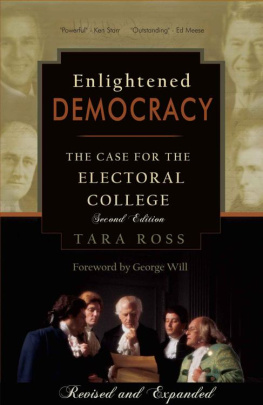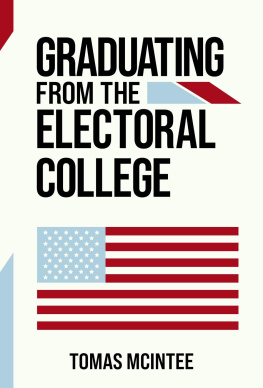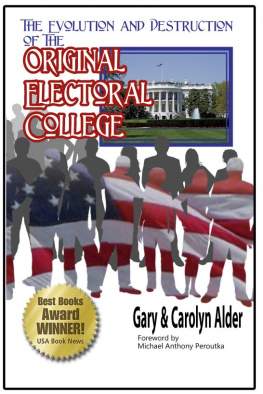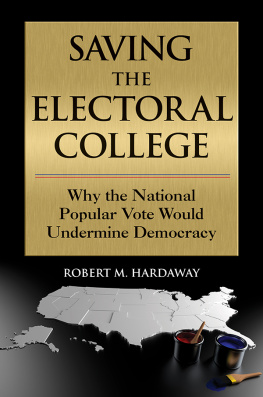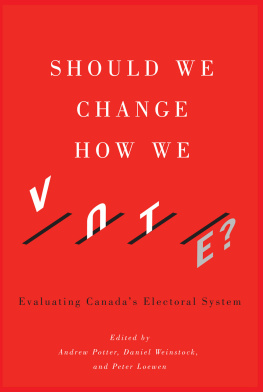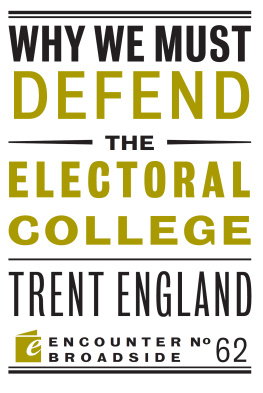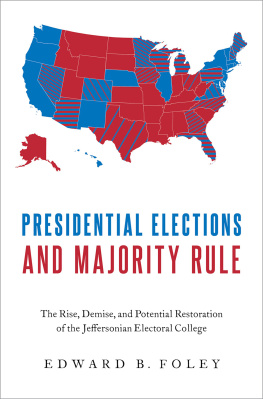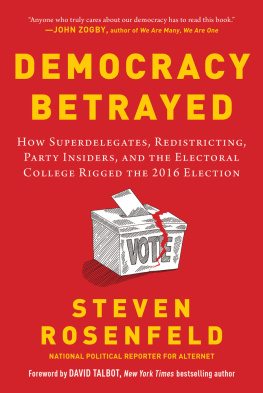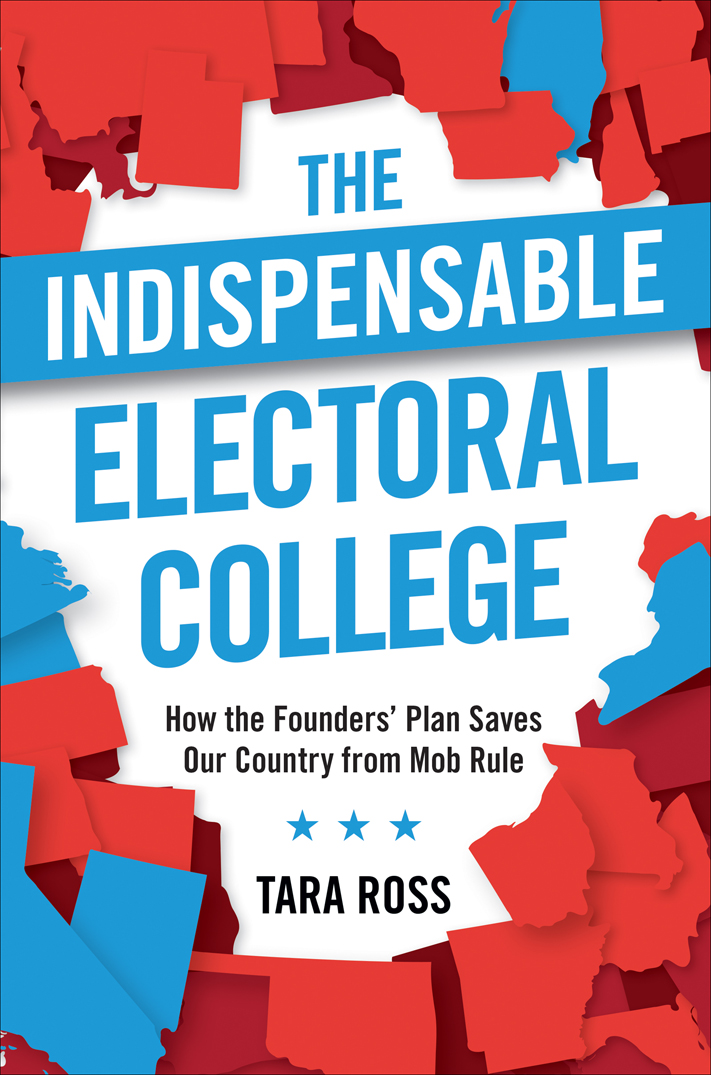PRAISE FOR
THE INDISPENSABLE ELECTORAL COLLEGE
Tara Ross once again produces a meticulously researched book that makes a compelling case for preserving the Founding Fathers vision of a federalist republic in which a diverse people have the tools to live peacefully together. Federalism is more than just a relic of a bygone age. It is an indispensable ingredient in Americas constitutional republicand its presidential election systemas The Indispensable Electoral College so capably demonstrates.
ROBERT M. HARDAWAY, University of Denver Sturm College of Law, author of The Electoral College and the Constitution: The Case for Preserving Federalism
Tara Ross again presents a well-reasoned blend of sound historical analysis and simple common sense. Her latest book gives Americans even more reasons to support and preserve the Electoral College.
EDWIN MEESE III, former U.S. Attorney General
A compendium of legal and historical analysis that nevertheless proves utterly engrossing, The Indispensable Electoral College represents a really splendid achievement. Anyone who reads the volume will find himself thoroughly purged of any impulse to do away with the Electoral College, feeling instead a deep appreciation for the odd but essential institution. Indispensable is the word.
PETER ROBINSON, fellow at the Hoover Institution and former speechwriter to President Reagan
The Indispensable Electoral College is an essential primer on presidential elections in the United States. Tara Ross offers a sweeping and nuanced examination of the Electoral College and provides a compelling defense for our oft-misunderstood election system. Her easy narrative style deftly navigates a deep body of history, politics, and law.
DEREK T. MULLER, associate professor of law, Pepperdine University School of Law


Copyright 2017 by Tara Ross
All rights reserved. No part of this publication may be reproduced or transmitted in any form or by any means electronic or mechanical, including photocopy, recording, or any information storage and retrieval system now known or to be invented, without permission in writing from the publisher, except by a reviewer who wishes to quote brief passages in connection with a review written for inclusion in a magazine, newspaper, website, or broadcast.
Regnery Gateway is a trademark of Salem Communications Holding Corporation
Regnery is a registered trademark of Salem Communications Holding Corporation
Cataloging-in-Publication data on file with the Library of Congress
e-book ISBN 978-1-62157-707-2
Published in the United States by
Regnery Gateway
An imprint of Regnery Publishing
A Division of Salem Media Group
300 New Jersey Ave NW
Washington, DC 20001
www.Regnery.com
Manufactured in the United States of America
10 9 8 7 6 5 4 3 2 1
Books are available in quantity for promotional or premium use. For information on discounts and terms, please visit our website: www.Regnery.com.
Distributed to the trade by
Perseus Distribution
www.perseusdistribution.com
For Adam, Emma, and Grant,
with much love
CONTENTS



Table of Contents
Guide
I am often asked if I would change anything about the Electoral College. My answer has changed over time. Perhaps that is unsurprising. I am older and have seen more of life than that third-year law student who started studying the Electoral College in 2001.
As a thirty-something lawyer, I was a firm believer in the system, but I also wavered a bit on the margins: should we fix perceived problems with the House contingent election? Should we work harder to prevent faithless electors? Or should we just leave the system alone? In Enlightened Democracy: The Case for the Electoral College, I joked that perhaps the best approach was if it aint broke, dont fix it. Yet I think I was afraid to trust that sentiment fully, and I still offered a few small fixes for readers to consider.
Those who read both Enlightened Democracy and The Indispensable Electoral College will doubtless see that my approach has solidified over time. The older I get, the more I think that if it aint broke, dont fix it is always the best approach to the Electoral College. Yes, some aspects of the system sound odd in our democratic-minded society. But making the system more democratic to accommodate modern sensibilities is not the answer. We serve ourselves best if we educate voters about the reasons that our Founders established checks and balances in our Constitutionand in our presidential election system. The Founders created checks and balances in 1787 to protect American liberty from the imperfections of human nature. Humans are still imperfect. Safeguards are still needed.
To some degree, this book is a compilation of things that Ive been writing and saying for years, either in books, blog posts, or in testimony before state legislators. But it is also far more than that. How could it be anything else in the wake of the 2016 election? If nothing else, that election showed us that anything can happen. We are blessed to have a system with so many checks and balances; it gives us the flexibility that we need, no matter what crazy circumstance heads our way. But we, as a country, need to understand the Electoral College better if it is to serve us with maximum effectiveness. The 2016 election demonstrated that most voters do not understand the intricacies of their system. Thus, they often felt trapped. I spent much of the 2016 election year being sad about the situation. How could so many feel so trapped when the system is actually quite accommodating? If knowledge is power, then I hope this book empowers voters.
This book is neither pro-Trump nor anti-Trump. It is neither pro-Clinton nor anti-Clinton. I ran early drafts of the manuscript by a variety of people, hoping to drive out anything that seemed to fall too much on one side or the other. I asked Donald Trump voters, reluctant Trump voters, Evan McMullin voters, Gary Johnson voters, and Hillary Clinton voters to review this book. I owe many thanks to those who helped in that effort, but Ive also decided not to list them individually here. I know how each of these reviewers ultimately cast his or her ballot, but I also know that many of them would rather not take a side publicly. Suffice it to say that they came from many walks of life and several had quite strong opinions about the 2016 election and the candidates. You know who you are. I so much appreciated your input and adjusted the book in several places in response to your comments. Ultimately, I hope weve worked together to create a book that will help voters of any persuasion to better understand those on the other side of the political aisleor perhaps even those within their own party.


